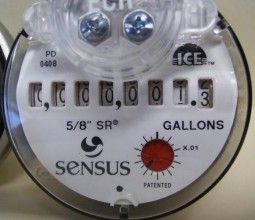Can tiered water rates be used to encourage conservation?
 A media firestorm erupted Monday, April 20, over Gov. Brown’s opposition to a State Court of Appeals decision in a water rate setting case involving Proposition 218. The initiative, passed in 1996, requires voter approval for any new property-related utility rates over and above the basic cost of service. Electric rates are not property-related and thus not subject to the ruling.
A media firestorm erupted Monday, April 20, over Gov. Brown’s opposition to a State Court of Appeals decision in a water rate setting case involving Proposition 218. The initiative, passed in 1996, requires voter approval for any new property-related utility rates over and above the basic cost of service. Electric rates are not property-related and thus not subject to the ruling.
The case involved is Capistrano Taxpayers v. City of San Juan Capistrano.
In a split decision, the Fourth District State Court of Appeals ruled that tiered water rates to spur conservation in the city of San Juan Capistrano and statewide “must be based on usage, not budgets.” But the court also ruled that the added cost of a water recycling plant can be tacked onto residential customers water bills, even though residences are “not plumbed to receive non-potable recycled water.”
Thus, the court evenly ruled both for higher water rates for all customers for recycled water; and against charging higher water rates only on big water users, which are not based on the actual cost of service for that price tier.
Nonetheless, the ruling caused a firestorm of news headlines that contradicted the judges’ ruling as a “blow to water conservation,” as ruling that tiered water rates were “unconstitutional” and as favoring “big users.”
Gov. Brown called the ruling a “straightjacket” on conservation efforts. Kelly Salt, an attorney with the water law firm of Best Best and Krieger, representing the State Association of Counties, League of California Cities and Association of California Water Agencies, said, “It is unfortunate that this decision came down during the worst drought in California history.” Even Tim Quinn, head of the California Association of Water Agencies, called the decision a potentially major blow to water conservation efforts. But it was unclear if their reactions were pointed at the court ruling or Proposition 218.
Judge: Tiered pricing allowed, but based on actual costs
Acting Judge P.J. Bedsworth made it very clear that the court’s decision did not rule out tiered water rates to bring about conservation:
“…one of the benefits of tiered rates is that it is reasonable to assume people will not waste water as its price goes up. Our courts have made it clear they interpret the Constitution to allow tiered pricing; but the voters have made it clear they want it done in a particular way” (p. 21-22).
In accordance with Prop. 218, the particular way the voters wanted it was to base each rate tier on the cost of service for the tier. The court ruled:
“…we do hold that above-cost-of-service pricing for tiers of water service is not allowed by Proposition 218 and in this case, City Water did not carry its burden of proving its higher tiers reflected the cost of service. In fact, it has practically admitted those tiers don’t reflect cost of service” (p. 28).
The city did not try to calculate the extra cost of providing water for each tier and used revenues from the top tiers to subsidize below cost rates for the bottom tier.
Benjamin Benumof, who filed the lawsuit for the taxpayers, said there is no conflict between the court’s ruling and water conservation. “The court simply invalidated ‘arbitrary tiered rates,’” said Benumof.
Brown looking for water rates to finance water tunnels
Jon Coupal of the Howard Jarvis Taxpayer’s Association stated in an email:
“Methinks Governor Brown doth protesteth too loud, to paraphrase Bill Shakespeare. First, the court did not reject out of hand tier water rates. However, the court did make it clear that water rates must be based on the cost of service. That is as it should be. The reality is that water districts and cities have many tools (fines, penalties, termination of service, voter approved special tax) to enforce conservation.”
 Gov. Brown and the California Association of Water Agencies are still looking for a financing mechanism for its controversial Delta water tunnel project. State water contractors will pay the largest share – 68 percent – of the bill for the tunnels, which would be passed on to water rate payers. The Association of California Water Agencies filed a “Friend of the Court” brief on behalf of the city in the case. The cost of the water tunnels, without wetlands restoration, which has been dropped, would be $42 billion.
Gov. Brown and the California Association of Water Agencies are still looking for a financing mechanism for its controversial Delta water tunnel project. State water contractors will pay the largest share – 68 percent – of the bill for the tunnels, which would be passed on to water rate payers. The Association of California Water Agencies filed a “Friend of the Court” brief on behalf of the city in the case. The cost of the water tunnels, without wetlands restoration, which has been dropped, would be $42 billion.
Brown’s Delta Water Tunnels Project has not been making much progress because of apparent difficulties in its financing. In December 2014, Brown dropped the huge pumps from the Delta water tunnel plan in favor of a gravity flow system, which is how the Sacramento Delta operates today. And a week ago, Brown dropped the Delta Restoration guarantees from the project as well.
An appellate court decision that would have invalidated the cost of local water service test for water rates from Prop. 218 would have made financing large state water infrastructure projects through local water rates a viable option.
Related Articles
Pension Funds' Odd Incentives
OCT. 12, 2010 By DAVE ROBERTS Billionaire investor Warren Buffett has compared investing in the stock market to gambling in
CA Forward's intentions awry
MAY 3, 2010 By KATY GRIMES “There’s the perfect world, and then there is the political world where the majority
SCOTUS stiffs CA suit against DirecTV
A high-profile lawsuit that could have increased consumer protections was shot down by the Supreme Court. “The justices by a



